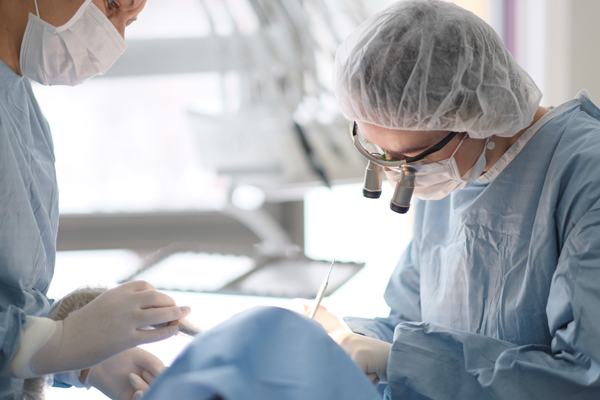Oral Surgeon vs. General Dentist: FAQs

When it comes to handling certain dental issues, it can be confusing to choose between the general dentist and the oral surgeon. The important point is to seek treatment from experienced professionals. If you want to decide between the oral surgeon or general dentist, the answers to the following questions might help.
How are general dentists different from an oral surgeon?
General dentistry and oral surgery are careers that demand further education beyond a bachelor’s degree. A general dentist goes on to complete four more years of dental school and graduate as a doctor of dental medicine. The degree makes the dentist eligible to join or start a dental practice, where they can have patients come in regularly for dental checkups and cleanings. They may not have the skills to perform all dental procedures, but they are knowledgeable and can make a referral if necessary.
Oral surgeons, also known as oral and maxillofacial surgeons, proceed to four more years of school after becoming a doctor of dental medicine or doctor of dental surgery. These four years are for a residency program in oral and maxillofacial surgery, and the surgeon eventually gets a certification by the state medical board. Some oral surgeons may use the period to obtain a master of science degree in dentistry, a medical degree or a Ph.D. While some people have a family dentist, oral surgeons usually serve as dental specialists who are engaged for special procedures and conditions.
What procedures do general dentists perform?
Usually, most people have a dental visit once or twice a year. It is crucial to visit a dentist to prevent issues such as tooth cavities and gum infections. The general dentist performs procedures such as:
- Monitoring gum and teeth health
- Filling tooth cavities
- Repairing damaged teeth
- Providing instructions for good oral hygiene
- Fitting dental restorations like dentures
One unique job of the dentist is to diagnose teeth and gum issues. For instance, a dentist may discover an overbite forming and recommend teeth straightening treatment from a dental specialist. When suffering from certain dental symptoms, it is advisable to visit the general dentist to get their recommendations.
What procedures are performed by the oral surgeon?
An oral surgeon specializes in oral surgeries. These dental specialists do not often fill cavities or perform dental cleanings. Instead, an oral surgeon performs specialized treatments for a patient, including:
- Placement of dental implants to replace missing teeth
- Extraction of wisdom teeth to prevent impaction or treat teeth impaction
- Widening of nasal passages through the removal of excess oral tissues to treat snoring and other sleep issues
The surgeon will keep the patient comfortable for the operation. They will provide post-operation procedures and may collaborate with the general dentist to restore the patient’s oral health. The skills of the oral surgeon can provide significant relief and restore dental functions.
In conclusion
If you need to undergo oral surgery, the oral surgeon is the dental specialist to meet. They have the training and experience and will evaluate your condition before recommending treatment.
Request an appointment here: https://monroe.premieroralsurgeryct.com or call Premier Oral Surgery & Implantology Center at (475) 474-6204 for an appointment in our Monroe office.
Check out what others are saying about our services on Yelp: Oral Surgeon in Monroe, CT.
Related Posts
Searching for the most knowledgeable and skilled oral surgeon in your area can be challenging. But if you find the right dental care provider, you can achieve the enhancements that you want or need. Finding the right provider will need a little effort. Here are some tips you must consider for choosing the oral surgeon…
Learning that you need an apicoectomy can cause anxiety. This procedure is a level higher than a root canal. Understanding this endodontic surgery can help you prepare for your upcoming appointment. Here are the things that you need to know about an apicoectomy.Research shows that dental roots are complicated structures. Bacteria invading the root branches…
Impacted teeth are a common dental condition where a tooth fails to fully erupt into its proper position in the mouth. This can occur due to crowding, abnormal growth angles, or obstruction by other teeth. Oral surgery, performed by specially trained oral surgeons, plays a critical role in managing impacted teeth, especially when complications arise…
Your oral surgeon will recommend the right oral surgery for your needs. Each treatment corrects a specific issue and can enhance your oral health in different ways. Knowing these procedures can prepare you well for the next visits. Here are the common oral surgery procedures and how they can benefit you.The oral surgeon will recommend…
